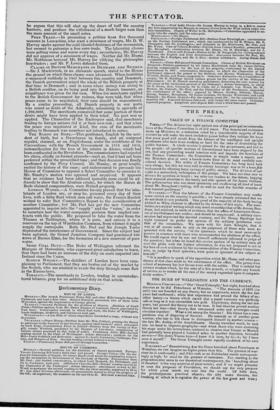THE PRESS.
VALUE OF A FINANCE COMMITTER
Tistas.—" The division last night against one of the principal recommenda- tions of the Finance Committee is of evil omen. The determined resistance made by Ministers to a reduction voted by a considerable majority of that commit.ee will make the most credulous pause before they indulge the hope that great good will result from the labours of the intelligent and upright gentlemen who have been working so hard for the sake of diminishing the public burdens. A whole session is gained for the government, and lost to the people : all specific motions of retrenchment have been stopped by the cry, that any proceeding would interfere with and impede the functions of the Finance Committee : the Committee at length make a report, and the Ministers give at once a knock-down blow to its most carefully con- sidered decision. The utility of Finance Committees has long been held very cheap ; but this we were told in solemn language was to be a hone: .17de instrument for effecting large savings of public money. The division of last right is a melancholy redemption of this pledge. We have not time now to discuss the question at length : we refer our readers to the debate, begging their especial attention to the manly and able speech of Sir James Graham. The gobemouches who run about sputtering and swallowing all kind of trash about Mr. Brougham's ratting, will do well to read the forcible remarks of that learned gentleman."
STANDARD.—" That the labours of the Finance Committee may confer some service on the country is possible ; we have already intimated that we do not think it very probable. One proof of the majority of this body having yielded to NVhig clamour is afforded by the debates of last night. The com- rnittee,in a style of writiugwhich very much resemblesthat of Mr.Jeremy Ben- tham, had resolved, in teeth of evidence, that the office of Lieutenant-Gene- ral of the Ordnance was useless. and should be suppressed. A military com- mission had expressed the decided contrary, and Sir Henry Hardinge last night ventured to prefer the opinion of the military gentlemen over that of the committee. We agree with Sir John Sebright, that it was at all events safer to rely on the judgment of those who were ac- quainted with the service, "in the ignorance which he must necessar.ly possess in common with those who recommended the abolition of the office. He would repeat that he was not himself sufficiently informed to judge of the question ; but when he heard this service spoken of by military men all over the globe with the highest admiration, he was not prepared to act in the face of such evidence by the recommendation of the Finance Committee, who, to judge by their speeches, vere quite as ignorant of the subject as himself."
"It is needless to speak of the opposition which Mr. Flume and other gen- tlemen of that class made to the continuance of the office. The penny-wise school of economy has lost favour even with the rabble. That is indeed but sinister wisdom which, for the sake of a few pounds, so cripples any branch of service as to render all the rest of the money expended upon it compara- tively useless."
























 Previous page
Previous page